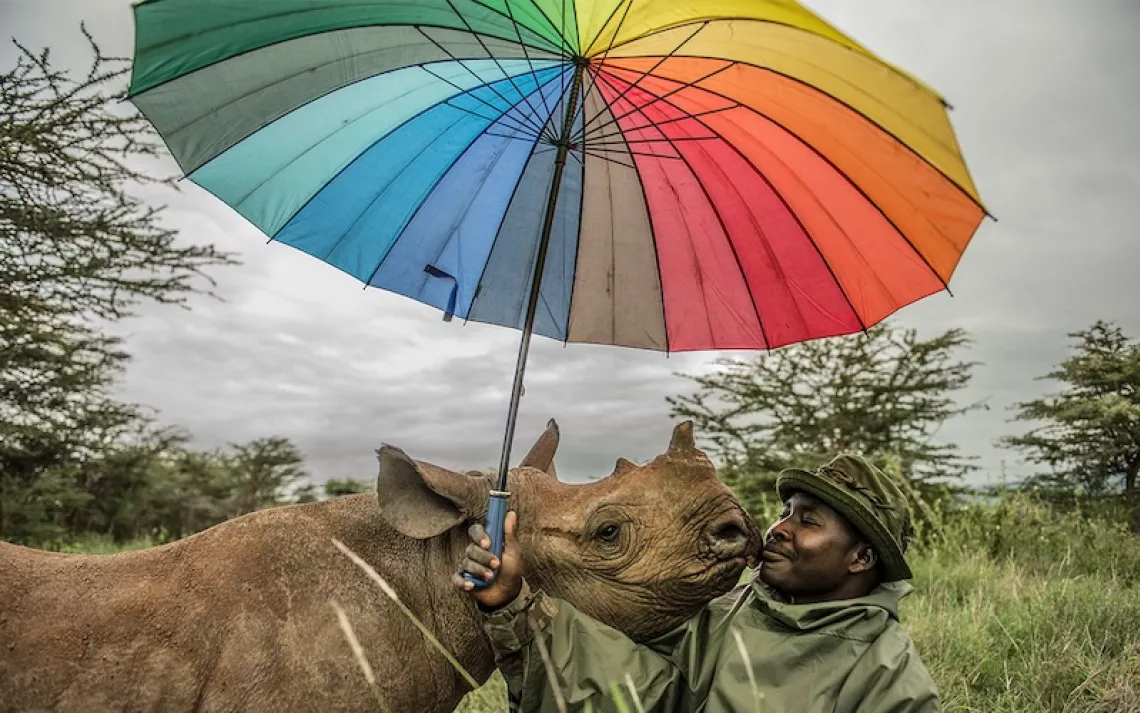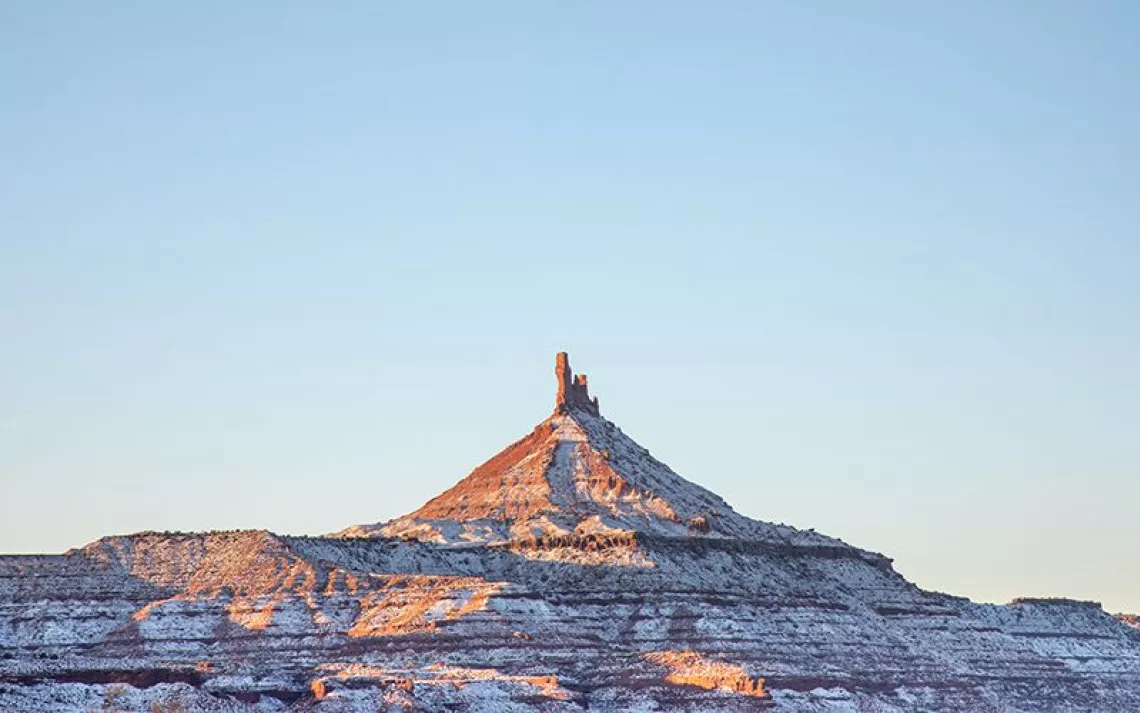Hope for the Future Lies in the Multitude
A conversation about capital, consumption, and population
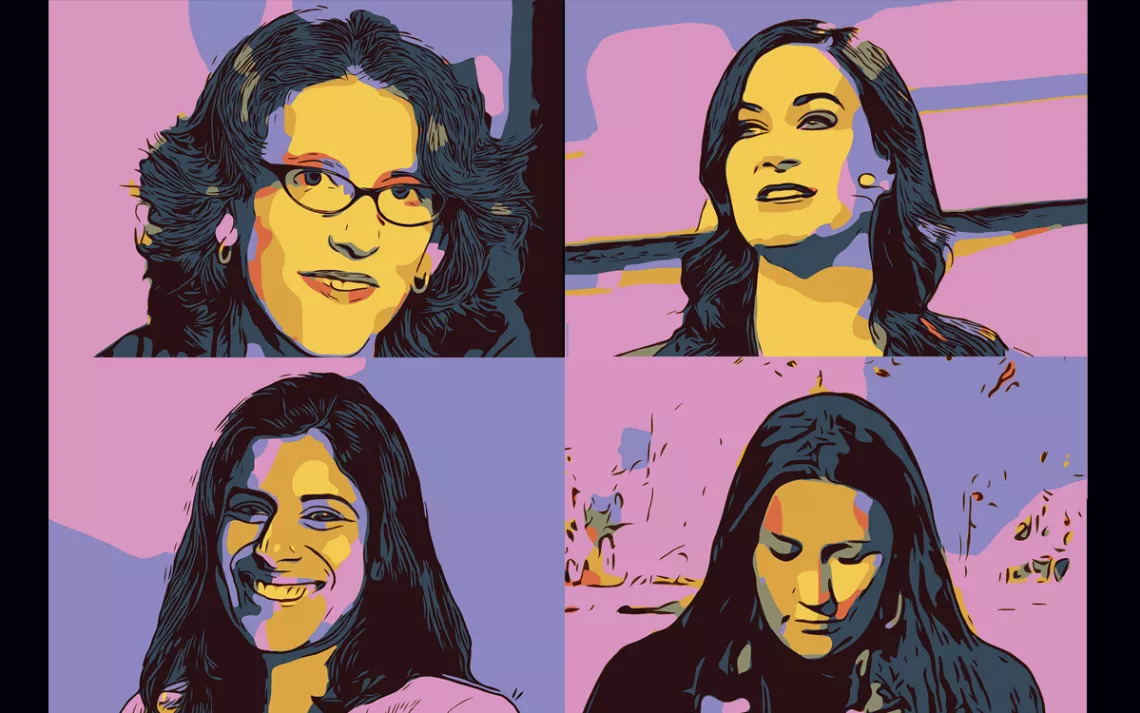
How can we better understand the intersections of climate, consumption, and population, and what can they tell us about the future of a warming and more populated world?
Societies consume at different rates. Corporations drive consumption habits and help create a culture of commodification in which we identify as consumers—of goods, of services, of brands. Often, what we consume, when we buy, when we travel, and whether we use this product or that product are influenced by constructions of gender, race, and privilege created by those same corporations. We are what we consume; in turn, we consume what we are told we are.
How can we transcend our culture of consumption in order to embrace more ecological practices, as individuals and as a society overall? Sierra convened a panel of four experts—Katharine Wilkinson, Sherri Mitchell, Juliet Schor, and Shahzeen Attari—to arrange the pieces of this complex puzzle into a clearer picture.
Katharine Wilkinson is the vice president of communication and engagement at Project Drawdown and was the senior writer of the New York Times best-selling book Drawdown. Sherri Mitchell teaches on issues of Indigenous rights, environmental justice, and spiritual change and is the author of Sacred Instructions. Juliet Schor is a sociology professor at Boston College and the author of True Wealth. Shahzeen Attari is an associate professor at the O'Neill School of Public and Environmental Affairs at Indiana University Bloomington and an Andrew Carnegie Fellow working on resource use and climate change.
The four gathered for a roundtable discussion this fall.
Katharine Wilkinson: The world is heating up. Climate impacts continue to unfold. Levels of consumption seem to be endlessly rising. The population continues to grow, as does wealth inequality. It's a lot, and it's entangled. We're going to try to unpack some of that, aiming for complexity and nuance but also clarity and simplicity. No small task.
Juliet, help us get started with some definitions. I find the root of the word consumption really fascinating: It's about using up. It's about wasting.
Juliet Schor: In the premodern era, there was an idea that consumption was a sort of wasting, of taking away, because there was more scarcity of consumables in those days. It's not until the 20th century that you get the rise of mass production and use of the world's resources that lead to an explosion of consumer goods.
Wilkinson: Just how much of the earth are we currently using up year to year, and what are some of the impacts that's having?
Schor: You can look at what's called the eco-footprint measure, a consumption measure of how much of the earth's resources—biomass and so forth—we use on an annual basis. By early August, we used up what we have and went into overshoot—passing the point in the year in which we start to run down the ecosystem.
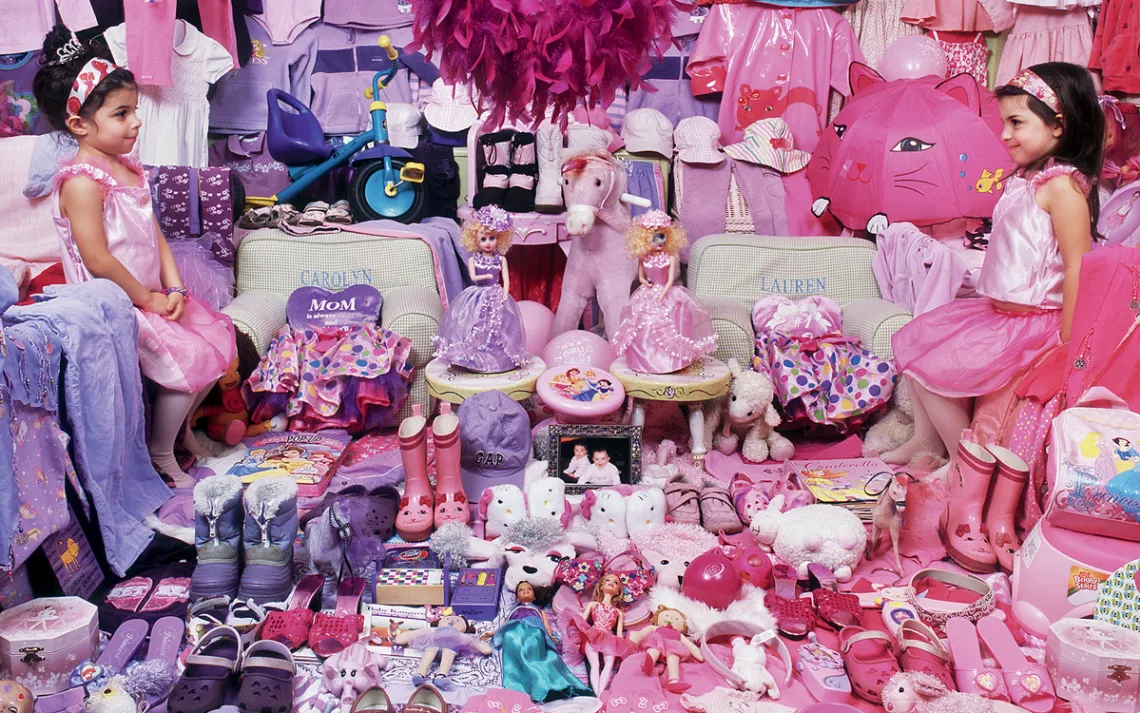
Photo by JeongMee Yoon
Wilkinson: Consumerism has only been with us relatively recently in human history. It seems to have had its roots in northwestern Europe in the 18th century. But it's clearly now a global phenomenon. How do you make sense of the spread and attraction of this consumer culture?
Shahzeen Attari: I grew up in Dubai. In the span of a somewhat short period of time, maybe 10 years or so, Dubai went from being a desert to a metropolis and a tourist hub. I got to see how a place that was far more natural at first became artificial very quickly.
Behavioral economists have shown that people want to consume more tomorrow than they do today. People want increasing wage profiles, and they want to make more than their peers. For example, if all of us worked in the same institution, we may want to make more money than everyone else. This is a deep psychological need that's very tightly wound to marketing and to the consumer culture. The question that I've been thinking about is, Are there ways to rethink our capitalism culture altogether? How can stories about alternatives help us reimagine our world? I think that's what a lot of people, especially in the climate change world, are starting to think about. We need to rethink how to untether consumption from growth, happiness, and satisfaction.
Wilkinson: Sherri, so much of your work is about looking to the past and to wisdom that's been held for many generations as a way to look to the future. I find that another interesting piece of the etymology resonates with your work: The word consume also means "to destroy by separating into parts which cannot be united."
Sherri Mitchell: I've been thinking about the fact that we see ourselves in one of two ways: We see ourselves as either a consumer or a commodity. The first product to enter into the trade market was the female body—in the form of land agreements that were negotiated through marriage. Women have been trained for the past 5,000 years to think about ourselves as commodities.
This issue of seeing ourselves as either a commodity or a consumer ties every bit of value that we assign to our lives to some type of consumption. When we think about the way that we derive value from the aspects of our lives that define who we are—our relationships with other human beings, the ability to have safety and security within our own homes—the value that we assign to them has been tied in some way to commodification or consumption.
It's important not only to recognize the history of commodification of the human being as part of the consumptive market, but also to look at this inability to see our own value and the value of life beyond a capitalist system, beyond this consumptive market, and how that's impacting our ability to sustain our own lives on the planet. Human beings have been around for 200,000 years, but in the past 150 years, we've caused an equivalent amount of damage to Earth as was caused throughout the entire existence of our species.
Attari: I have felt exceptionally uncomfortable with the commodification of our information, so much so that in the past few months I've completely given up Facebook and LinkedIn. These platforms have started commodifying our information without the needed consent.
Mitchell: It's really about extracting our lives from the marketplace and getting to know who we are, how we assign value, how we have denied our own truth. How we have hidden away the things that are most important to us in order to align ourselves with what's being promoted as most important within the popular culture. When you're single, people say that you are "on the market." Even the way we talk about these things is connected.
Wilkinson: I found it really shocking that our global use of materials is outpacing both population growth and economic growth. It feels to me like that is sort of the engine of spiritual desperation or something. Juliet, clearly we are overconsuming Earth, taking more than can be regenerated, generating more waste than can be metabolized by the living systems of the planet, but also clearly not all consumption is created equal. Some people are consuming wildly more and wildly differently than others.
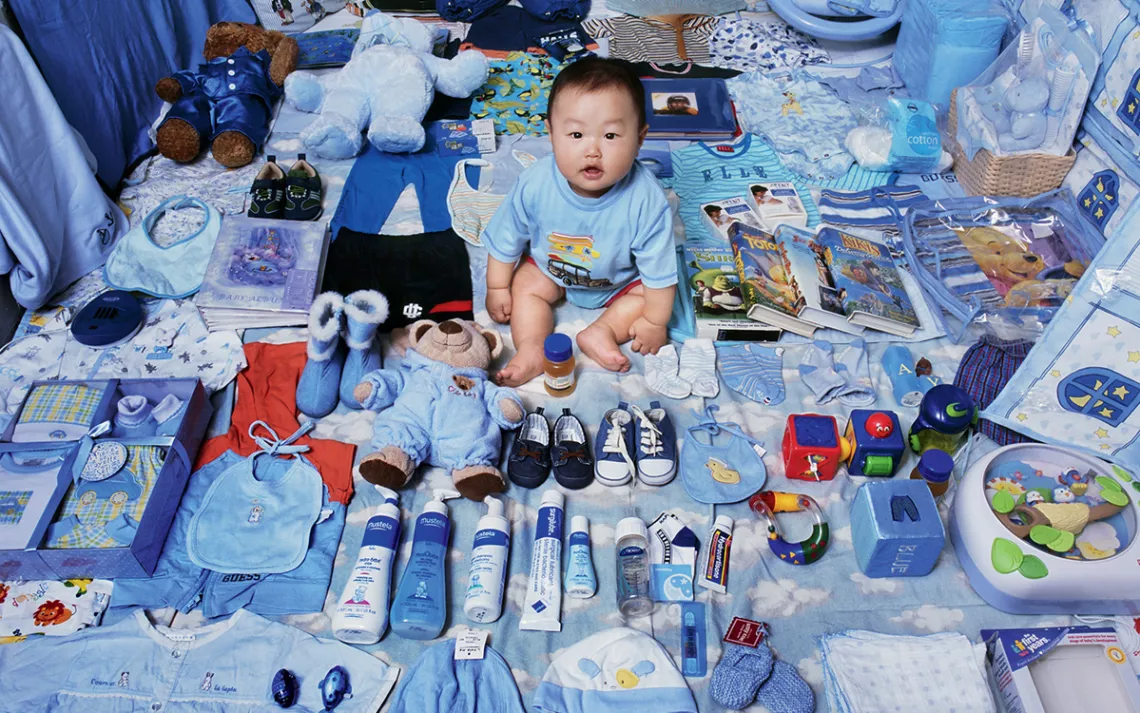
Photo by JeongMee Yoon
Schor: Let me just start with a point about language. Even that language of "we are consuming," that royal "we," is pointing us in the wrong direction. Biology, economics—these are disciplines that have come at the problem in that way because they think about the average person. We need to depart from that and think about the fact that consumption is so unequally distributed, and impacts are so unequally distributed.
For example, 10 percent of the world's population is responsible for about 50 percent of greenhouse gas emissions, and about 60 percent of those people are in the Global North. The bottom half of the world's population is responsible for about 15 percent of emissions. So in that sense, it's not a "we" problem. In a way, I think this should make our problem easier, because it's less about whether everybody's behavior has to change massively. Yes, there's some of that, but really, it's a more potent approach if we focus on where those disproportionalities are.
Mitchell: What we need to think about is how do we bring those who are the biggest power brokers on the planet to heel? We understand that these are the individuals who have been causing the greatest amount of harm. We understand that there are certain practices that have led to the most consumptive trends that we've seen on the planet, and they're certainly associated with extreme wealth. What ends up happening is that those in this top tier are consuming at really high rates, and they're making use of the most wasteful, inefficient, industrial machinery. Then the second-tier people are using that wasteful and inefficient machinery, and it keeps going down through these imaginary hierarchical lines.
It's not just a simple process of needing this group of people at the forefront of the destruction to have their own moral awakening about the harm that they're causing and the destruction to life that is resulting from that. You also have to deal with the emotional and spiritual illness that consumption has become on the planet and how it has become a measure of success.
Wilkinson: Shahzeen, how can we think about the dynamic of human population size and growth given these issues of inequity in wealth and consumption and carbon footprints?
Attari: I think focusing on population squarely does not take the entire picture into account. In the United States, we actually can see population growth declining over time. Even though our overall population is increasing, the growth rate has been falling over time, so that's actually a good trend, in my view. But I think focusing just squarely on population, especially when you have large population increases in the Global South, is not painting a fair picture.
Wilkinson: I think it is worth noting that in the process of moving the fundamental rights of women and girls forward—access to education, access to comprehensive voluntary reproductive health care—we see that women generally make the choice to have fewer children and to marry later. It turns out that the choices women make about their own lives also tend to be good for the overall human family and for the planet. Every woman should be able to decide if she wants to have children, when she wants to have children, and how many children she wants to have, and to be able to do that in a way that is safe and healthy.
Is reducing wealth inequality a fundamental climate solution? Is that one of the takeaways we can derive from that 10-percent-responsible-for-50-percent-of-impact sort of ratio?
Attari: Absolutely yes, because we're at the point now where we can't just be talking about mitigation alone. We have to start talking about adaptation, and we have to start talking about resilience. Resilience matters most not to the wealthiest but to the least wealthy among us, and decreasing income inequality directly helps in that regard. Unless we can find effective ways for the people who are the least wealthy among us to figure out how to adapt with the funds that they need, with the programs that they need, we're in an awful situation.
Mitchell: I also believe that when we're dealing with inequality and we're looking at this incredible growth in income disparity—where the wealthy are getting wealthier and the poor are getting poorer—what it gives us is a distorted view of what the standard is. When you have people who are extremely wealthy believing that the standard of living for the average person is a $250,000-a-year income, the standard that we need to survive, the standard that we believe in our minds we need to have in order to have enough becomes grossly distorted. We have a lot of teachings about what we call "the value of enough." What is enough to be able to sustain our lives with a sense of dignity and a certain degree of safety?
That piece is really important, because the evidence doesn't support the hypothesis that it's simply a population-growth problem. There's more evidence to support that it's this growth and the disparity of income levels and the wealth gap that is creating a distorted view that people are striving toward, that's driving consumption.
Wilkinson: When we talk about consumption, there's sort of this implicit finger-pointing toward individuals, toward consumers. But of course, there is no consumption without production. There are no consumers without corporations. Where should we really be pointing the finger here, and how should we think about that sort of chicken-and-egg kind of problem?
Schor: The chicken-and-egg question is really interesting, because on the one hand, you can say it's a system, every point in the system matters, and that's true. But I've studied the relationship between consumption and system change for a long time, and one of the things that's really important to understand is that consumers are not the leading agents of our system. They are much more—I don't want to say passive, but they just go with the flow. They don't have the power that drives the system. They adapt to what the production system is offering. The key point here is that the level or the scale of ecological and climate degradation is in large part driven by the scale of production. We produce, the money goes to people, all of the dynamics that we've been talking about are set into play by that flow of income.
But let's not forget: It's just a mere 100 companies that account for more than 70 percent of all the carbon pollution in the world. They are driving this. It's those elites that are driving the system, not the ordinary person who's just responding to a world that says consumption is what matters.
Wilkinson: I've been struck recently by how many folks even within the climate movement still very much buy into the economic story of "growth forever and ever amen." It just seems like a pretty logical thing to think through: If the sources of economic growth are basically human capital and natural capital, and we know we are expending natural capital wildly and human capital is not infinite, how can growth even plausibly continue forever?
Schor: There is no question that the rapid growth of the past roughly 70 years, what they call the Great Acceleration, the post—World War II period, has been monumentally devastating for the planet. It's what put us into the Anthropocene, the era in which humans are actually changing the basic chemistry of the planet. One of the things that's happened is that growth used to be something that you could plausibly argue was pretty much good for everyone, especially those people at the bottom. In the couple of decades after World War II, growth led to more equality and lifted people up. Beginning around the 1980s, growth starts to do the opposite. Growth is what's creating more inequality, and of course all of that growth is ecologically very destructive. We're still trapped in the view that growth is going to solve our problems. That view is decades out-of-date.
One of the most interesting things about the way politics in the United States has changed, the way it's changing in some other places too—the Green New Deal is a great example of this—is that it is no longer so growth-centric. It's saying, "OK, what do human beings need? We need education, we need health care, we need security, we need housing, we need a clean environment, we need a safe climate." The Green New Deal does not say, "Let's gin up the economy and hope that a rising tide lifts all boats or people will get jobs." It says, "We're going to give them jobs, and we're going to give them decent wages." Moving from a growth-centric approach to, let's call it a need-centric or human-centric approach, is really important.
Attari: People collectively are far more powerful than they realize, and we're starting to see that in action, with both the Sunrise Movement right now and with the excitement around the Green New Deal. A lot of my own work looks at how individual behavior facilitates changes in policy support, and what we found is that people really want to know what they can do to make a difference. For example, a lot of climate change scientists and researchers have a very large carbon footprint because we fly a lot. In terms of my own total carbon footprint, flying dominates all sectors. We experimentally tested how having different carbon footprints affects credibility and policy support. People have much stronger policy support when the communicator, the climate communicator, has a smaller footprint than if the communicator has a larger footprint.
People want to see how to be the change, how to dream of this new future, and they're willing to come along. I'm really interested in unleashing the power of narrative, the power of collective action, as opposed to just looking at individual behavior or a simple policy instrument.
Mitchell: We have to be able and willing to change our thinking about certain entrenched beliefs that we have adopted throughout the entire era of this colonial, patriarchal, capitalistic system.
One of those beliefs is that someone else will come and solve the problem. Entrenched in patriarchy, entrenched in colonialism, is this notion of childlike dependence. That means that we settle for the solutions that are offered to us. We have an illusion of choice. We need to start taking responsibility for the state of our world by moving beyond this childlike dependence, moving beyond this binary thinking, recognizing that it's going to be a whole number of smaller, localized communal initiatives that are going to actually move us in the direction that we want to go in.
It's really a radical change in thinking; it's about us being able to break out of the reservation of the mind and start breaking free from these illusions that we've been fed and bought wholesale, and freeing ourselves to think more creatively and more critically about the systems that we've developed collectively.
Wilkinson: Where do you all think we're seeing footholds? Where are we seeing things in motion that may give us a glimpse into what's possible for the future? There's a lot to feel pretty bleak about in this moment, but surely there are some bright spots that we might look to and learn from.
Mitchell: I think that the most hopeful thing that I have seen is a real willingness from younger people to forgo the status quo. They are not only willing but also desiring to live with much less. They're moving away from the pathway that others have always told them was the pathway to success.
Attari: What I found very hopeful and inspiring is the youth movement around climate change. I think that in itself is really powerful. My students are becoming much more politically active. We just had a student run for city council because he wants climate change to be a front agenda item for Bloomington, Indiana. What else I find exciting is that there's a growing feminist movement around climate change. More women in the fields of arts, science, activism, and journalism are pushing the boundaries and trying to take back the conversation and trying to own parts of the solution that have in the past not been ours. I find hope in this multitude of actions and voices.
Schor: In the last year or so, the resistance to the fossil fuel industry and to our dependence on a destructive way of life has really exploded. We've been talking about the Sunrise Movement and young people, but it's bigger than that. I think that both industry and politicians—and everyone associated with the status quo trying to prevent serious action on climate—are on the defensive. We're winning lawsuits; industry is losing in court. It is now common sense that we are going to get off fossil fuels. That was unthinkable even five years ago. I don't know if we're going to be able to expand and become powerful enough in this period of time to allow us to avoid some of the really horrific things that we're facing. But we're in a much better position than we were five years ago.
Mitchell: There is now international recognition that the protection of Indigenous lands is synonymous with the protection of the planet. People understanding that shows me that there's a real cultural shift away from the ways of thinking that have led us to where we are, and that we're moving back toward a more harmonious and balanced relationship with not only the earth but also the peoples of the earth. To me, that's very encouraging as well.
Wilkinson: Journalist Emily Atkin has done some great writing about this nexus of climate crisis and consumer culture and being honest about the thing that people sometimes don't want to say, which is that there will be individual "sacrifice" in this, for those of us in a higher-consuming culture or higher socioeconomic status. There will have to be less flying. There will have to be less Ubering. There will have to be less red-meat eating, less wasting of food, less buying of things that we don't really need. But in that "sacrifice," we may actually find that it is not a sacrifice at all. That in some ways the planet may be forcing us into a kind of emotional, psychological, spiritual evolution simply out of necessity and a sense of limits.
Are there action steps you might leave folks with to help them make personal and systemic changes?
Mitchell: I think that the action step is to start looking at the ways that you have commodified your individual being in your life, and how you can start moving back toward wholeness. The planet is forcing us back into relationship with the source of our life. If we're less able to engage in all of these forms of escapism, which the majority of our life has become, then we're going to be forced to move into a deeper relationship with the people in our community.
Wilkinson: There's been so much talk recently about climate grief or climate anxiety. Pick your hard emotion. The only thing to me that seems to make a difference is to hold that emotion in community, and in collective—to surrender to it and then rise back into shaping the future that we want.
This conversation was edited for clarity and length.
This article appeared in the November/December 2019 edition with the headline "Hope in the Multitude."
This article was funded by the Sierra Club's Gender, Equity, and Environment program.
 The Magazine of The Sierra Club
The Magazine of The Sierra Club
